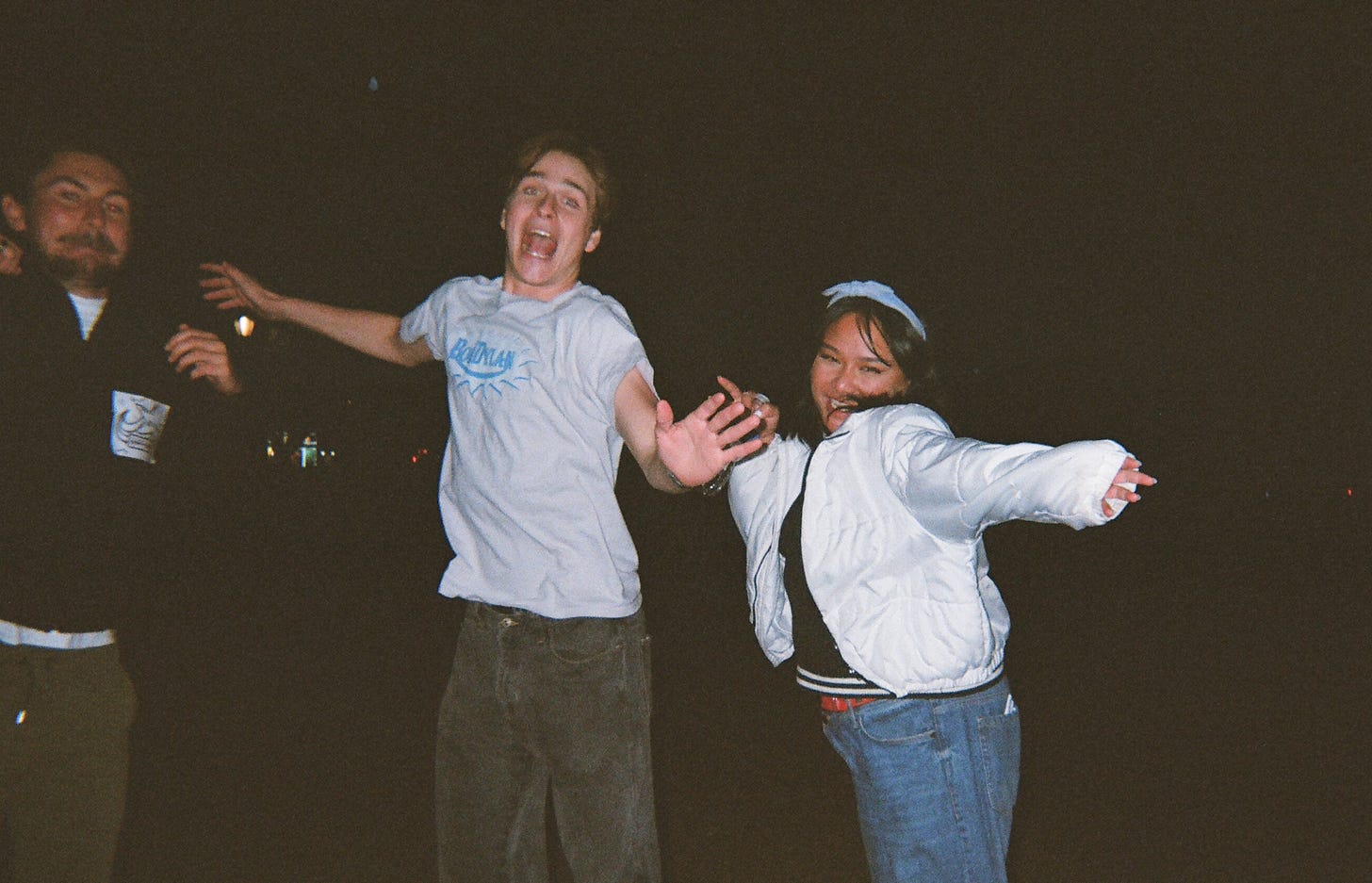
A growing community of organizers, activists, and motivated individuals are hitting the streets to push back against the forces of extractive tech. This wave of collective resistance is not just manifesting through traditional protests, though public demonstrations against companies like Meta, Apple, and Palantir are picking up. Rather, widely held feelings of frustration are motivating bolder and more inventive acts of defiance: carnivalesque parades and mass graffiti détournements of a reckless ad campaign, to name a few examples. The prevailing logic of these happenings is clear: the way to overcome an addictive and exploitative industry is to refuse it in favor of more humanizing alternatives.
To be an activist right now is to push outside of Big Tech’s imposed interfaces by practicing the forms of attention (shared, embodied, sustained, and so forth) to exercise full human agency against the coercive pressures of Zuck et al.
We talk a lot at SoRA about modeling other ways of being that “cannot be commodified.” That’s precisely what’s happening in public gatherings that invite participants to step out of their roles as data-generating consumers and instead step into those of high-agency people. Some of these events have ties to SoRA, with facilitators and other members of our community contributing—but it’s all happening spontaneously at the grassroots, with no single group in charge.
A DELETE DAY IN THE PARK
I co-hosted a Delete Day two weeks ago in Tompkins Sq. Park. Delete Day was the kickoff to the “Time to Refuse” campaign, a grassroots effort in support of tech refusal through education and public events. Spearheaded by Appstinence, Reconnect, and The Anxious Generation, it has blossomed into an international effort with many groups collaborating and imbuing their perspectives. Our goal at this collaboration between various organizations, artists, and educators was to carve out spaces to live without certain platforms in solidarity with each other.
We opened the event to the public and relied heavily on word of mouth and direct invitations—chalk on the street, friends tabling with fliers, announcements yelled from passing Citibikes.
Attendees were handed booklets at the entrance of the green and then invited to sit around the makeshift stage. Facilitators started group discussions: Why are you here tonight? What will you do with the time you get back? These questions gave everyone space to think through alternative ways of keeping up with the news, staying in touch with friends, meeting new people, and more. Participants exchanged helpful resources as well, from local publications to recommendations of less exploitative digital spaces like Signal and Arena.
Once the picnic blanket circles filled up with some 80 to 100 people, one of my co-hosts, Gabriela, set the tone: “I see a burning desire for a better life,” she said, calling the day a milestone for collective action.
Our friend Jackie went on to lead everyone in a ritual, holding nothing back as she decried the shit our generation grew up through: “I want you to put your phone on your head,” she started as she paced through the crowd. “Feel that lithium ion battery in there … feel that chain of child labor … you’ve spent years of your life on this thing already — can you believe that?!”
As Jackie counted down from fifteen, participants brought their phones to hand and located the delete buttons of their respective apps. Deletion itself took an extra beat — these companies don’t make it easy with their verification codes, password confirmations, and subtle glitches. But soon enough, as the chorus of “wait a sec” and “hold on” subsided, we burst into a primal cheer.
Having rid myself of a stale LinkedIn account, I hopped between picnic blankets chanting “I deleted!” We fed off each other’s joy—which sprung not just from the act itself, but for the shared leap we’re taking, away from the status quo of over two decades, and towards each other.
Facilitators handed out cheeky “iDeleted” stickers while more participants shouted for all to share in their ecstasy: “I’m done with Hinge!” “No more TikTok!” At one point, someone from the Light Phone, a Brooklyn-based “dumbphone” company, jumped on stage. He had no apps to delete, but he came with two new devices to give away.
Many stayed after for a phone-free party with a game organized by my friend Sean of Reconnect. You could call it a form of “attention sanctuary,” a friendly cousin of no-screen school policies and unplugged bars like Hush Harbor in D.C. and the Powder Room in Austin.
Deletion and phone-free spaces open the door to lasting cultural shifts. If we can normalize these, we increase the extent of our agency amid the exploitative pressures of Big Tech. Think of these as small but significant acts of world building.
Nick Plante is a Brooklyn-based organizer and community educator. He advocates for more robust tech policy,and hosts events around the country to foster deeper agency and connection. His column, On the Ground, follows current activist efforts against extractive technology.
If you’re interested in hosting a Delete Day, or if you want to learn about more action surfacing on the ground, don’t hesitate to reach out!


Wish I had known! Oh well. Next time!!!❤️